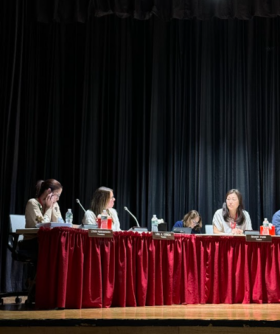The Syosset Board of Education announced its anti-bullying programs at the Oct. 15 board meeting.
“October is bullying prevention month, so all of our buildings districtwide have a number of activities that are scheduled and planned in order to make sure that students are alerted,” said Superintendent Thomas Rogers.
The Syosset character education program, P.R.I.D.E., stands for Patience, Respect, Integrity, Dignity and Empathy.
“This focus on developing positive culture, climate and character promotes student connect,” said Jeanette Wojcik, assistant superintendent for elementary curriculum, instruction and assessment.
The P.R.I.D.E program looks different at the elementary, middle and high school levels to provide age-appropriate learning opportunities, officials said.
“At the elementary level, we address bullying prevention in three strategic ways: fostering connections, social-emotional learning and developing perspectives using critical thinking and problem-solving,” Wojik said.
Teachers work to establish social awareness and conflict-resolution skills in the classroom, she said. Elementary schools promote diversity and inclusion by hosting schoolwide events as well, Wojik said.
“This inclusive approach strengthens interpersonal connections and creates a welcoming environment for all,” she said.
The elementary schools implement a kindergarten buddies program, where fifth-graders are paired with younger students. This partner work allows older students to showcase school values to their peers.
“We have fifth-grade students that are modeling for our kindergarten students what’s expected behavior,” said Walt Whitman School principal Chad Snyder.
There are also schoolwide assemblies and PTA events that promote student unity, said Denise Glenn, Village Elementary social worker.
Rogers said each school now has a full-time social worker in the building. Their presence in each building allows the district to take a more proactive approach to bullying prevention, he said.
The middle school aims to build upon these values and principles in programming, officials said.
“Middle schoolers have the unique experience of falling between two very challenging developmental milestones,” said school psychologist Taiisha Foster.
Foster said there tends to be an increase in bullying during this stage as students grapple with their identity and sense of self. She said students often shift their attention onto their peers when they feel self-conscious or overwhelmed.
“There is often an increase among middle schoolers with respect to bullying and, more particularly, identity-based bullying,” Foster said.
Foster said the middle school curriculum aims to develop empathy and reflection.
Middle schoolers attend daily advisory to speak with administrators and peers to form connections. There are peer leadership clubs and PTA programs as well.
The schools recognizes Wellness Week, Multicultural Week and visit the Holocaust Memorial and Tolerance Center on field trips to promote inclusivity.
Foster said abstract thinking helps students with “understanding themselves, but also understanding themselves in relationship with other people.”
High school curriculum builds upon this foundation by establishing critical thinking skills, cultural awareness and effective communication, said high school assistant principal Chris Ruffini.
Assistant principal Shai Fisher said the curriculum is accomplished through peer leadership, advisory sessions, social studies courses and health classes.
Fisher said the school uses an anonymous tip reporting system called “Say Something.” The system allows bystanders to take action by alerting school administration.
Clubs and athletics are offered to make students feel connected with and involved in the community, Ruffini said.
“Our clubs and extracurricular program is important for students in terms of a sense of belonging at the high school,” he said.
Ruffini said extracurriculars promote positive collaboration and reduce peer conflict.
“We have over 100 clubs at the high school. Thriving at the high school,” he said.
Board of Education Trustee Lynn Abramson asked about school personnel in the buildings.
“The school’s personnel being involved in it is going to be absolutely integral,” she said.
“It is extraordinarily difficult for students to report. It is extraordinarily difficult for upstanders to report. It’s just one of those things,” Abramson said.
Abramson said personnel involvement is essential because bullying spreads through classrooms quickly.
“Things become systemic super fast. So one kid calls a kid a name, seven kids call that kid a name,” she said.
Restorative practice must be looked at on a wide scale, she said.
District officials said awareness comes from administration and staff, students and families. School personnel involvement allows a more proactive approach to anti-bullying.
Trustee Shany Park said there might be opportunities to collect data with graduating seniors or alumni by conducting exit interview-style surveys.
“Are we reaching 100% of our students?” she asked. “Do we have an eye on every single student in our district?”


































